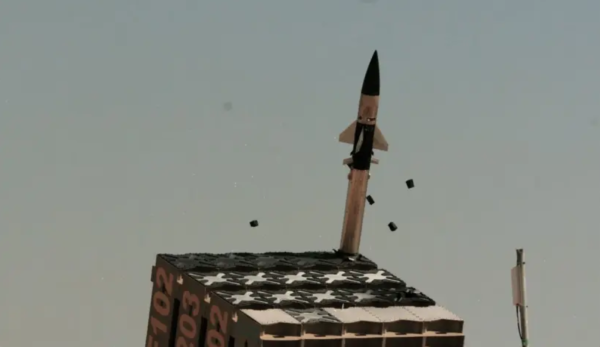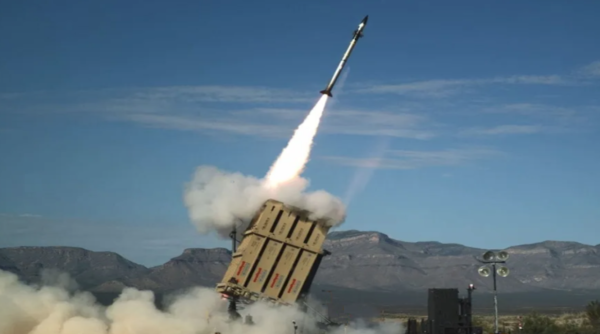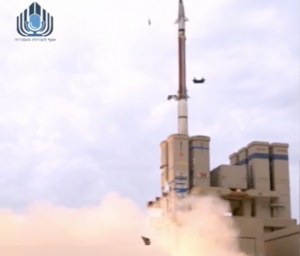
The Reuters report comes the same day when the US Army had successfully tested the Iron Dome at the White Sands Missile Range, and a month after the Marine Corps first tested the missile interceptor.
The US State Department has approved the potential sale of Terminal High Altitude Area Defense system missiles, THAAD fire control and communication stations, and related equipment to the United Arab Emirates, Reuters reported this week. In addition, the “State Department has approved the potential sale of Patriot missiles and related equipment to Saudi Arabia in a deal valued at up to $3.05 billion,” the Pentagon said on Tuesday.
These are big deals, both in financial and strategic terms. The deal with the UAE is worth $2.25 billion, the Pentagon said. The news comes the same day as reports saying the US Army had recently tested Iron Dome at White Sands, and this just a month after the Marine Corps also tested the missile interceptor at the military testing area in New Mexico.

US Marines’ air defense prototype with Iron Dome parts – Photo Courtesy: USMC
While these appear to be two different stories – American air defense sales to the Gulf and Israeli air defense technology being tested by the US – they are, in fact, related air defense stories.
The creation of multi-layered air defense, which Israel has pioneered, matters now more than ever.
The Israel Missile Defense Organization (IMDO) in the Directorate of Defense Research and Development leads the development of Israel’s multi-tiered air defense array, based on four operational layers: Iron Dome, David’s Sling, Arrow 2 and Arrow 3.
RELATED:
- U.S. Congress wants to protect American forces with Israel’s Iron Dome
- REPORT: The US convinces Israel to sell Iron Dome to Saudi Arabia
- Israel’s Refael signs Iron Dome collaboration agreement with Romania
The US Missile Defense Agency and Israel both work on development of Arrow, and the US backs Iron Dome and David’s Sling. This is part of an even wider program of US congressional support for Israel regarding air defense and other technological partnerships. In November, the Defense Department established the US-Israel Operations Technology Working Group (OTWG) to strengthen partnerships.
There is also the Deterring Enemy Forces and Enabling National Defense Act that authorizes the DOD to cooperate with Israel, Egypt, Jordan, Iraq and the Gulf Cooperation Council. The US also wants to work on countering Iranian drones.
Add all this up, and one gets an emerging picture of how air defenses are reshaping US-Israel ties and the region. Where once Israel was a small country searching out better air defenses, it has now become a powerhouse of technology. At the same time, Washington has finally decided to advance the big sales of large air defense systems that are needed in the Gulf. This also comes as branches of the US government are testing Iron Dome.
So what comes next?
It will take time for Saudi Arabia and the UAE to acquire and deploy the new defenses. According to The Wall Street Journal, the US held a secret meeting earlier this year with defense chiefs from the region, including Israel. These included defense officials from Saudi Arabia, Qatar, Jordan, Egypt, the UAE and Bahrain. Israel already works closely with US Central Command, the UAE and Bahrain.
Meetings with Saudi Arabia or Qatar would be more unique, however. Any air defense ties between Israel and the Gulf would be a significant game changer for the region. Reports have said that cooperation could include Israeli technology, like sensors, in the Gulf, as well as other aspects of a regional air defense operation, with US support in the background.
“According to a Western source, Saudi Arabia and the UAE not only have the largest defense budgets, but also have the most urgent need for air defense systems,” according to a report by the MirYam Institute in February. “The source said Israel could theoretically supply three types of air and missile defense systems.

David’s Sling launched – Photo: Israel Defense Ministry
The first is Rafael’s David’s Sling air defense system. One variation of this option is providing Rafael-made SkyCeptor interceptor missiles that can be fired from Patriot batteries, the source explained. Patriot batteries are already in the service of Saudi and Emirati air defenses.”
The Biden administration has been pressing for Israel and the Gulf to build on the Abraham Accords. The president also wants a reset in relations with Riyadh. This comes after a downturn in US-Saudi ties, when the Saudis, Emirates and others were looking to Europe for defense deals. But that was a temporary reality, because those countries had agreed on major deals during the Trump administration.
Countries like South Korea are also securing big defense deals in the Gulf. In January, reports said that Seoul had signed a preliminary deal with the UAE to sell South Korea’s mid-range surface-to-air missiles to the Gulf. The Emirates is also buying Rafael fighter jets from France for $18 billion. The Gulf States also want more drones.
In this context, the Gulf is finally getting the air defenses it needs. Greater US support and sales of the right technology can give the region the multi-layered defenses it requires. The truce in Yemen also means there is time for these countries to breathe and take a look around the Gulf.
Six months ago, there was a rising drone threat to countries like the UAE. Today, Iran may be toning down the threats. THAAD is essential. It was used, for instance, in January to down a missile fired from Yemen at the UAE. Saudi Arabia has used Patriots for many years. Now more and better air defenses may be on the way.
View original The Jerusalem Post publication at:
https://www.jpost.com/middle-east/article-713809
ISRAEL
‘as a light unto the nations’






 Israeli New Shekel Exchange Rate
Israeli New Shekel Exchange Rate